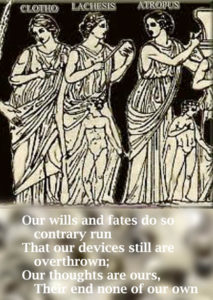 “But, orderly to end where I begun,
“But, orderly to end where I begun,
Our wills and fates do so contrary run
That our devices still are overthrown;
Our thoughts are ours, their ends none of our own.”
(Hamlet, act 3, sc. 2)
Tips for Use. An eternal truth rendered in a way that will make you be original when you express it. A good answer too, to justify an unexpected course of events.
When man-primate stood on his hind legs, the skill he acquired came at significant cost. It was the dawn of the reflective mind. In turn, the reflective mind caused a weakening or rather the extinction of some perceptive faculties and also of some other forms of sociability that allowed a greater autonomy of the individual. The function of memory– though we still don’t know how it works – changed the perception of how we transition from the past to the present and from the present to the great unknown of the future. At this point the figure of death appeared on our mental screen, and with it the tremendous necessity that our existence should have a meaning. We cannot exist without a theme that may organize our otherwise disorderly crowding of thoughts. The next logical step was the idea of planning and of the assumed power of our wills. Only to discover, as in the lines quoted, that the power of our will is grossly exaggerated, as Mark Twain would say. A truth hardly acknowledged, let alone learned, by sundry politicians, Wall Street fraudsters and Pentagon fanatics.
A reminder for those interested in mythology. The illustration shows the three Parcae, namely,
Clotho, who appeared as a maiden and spun the thread of life. Her name meant The Spinner,
Lachesis, who appeared as a matron and measured the thread of life. She was the Caster of lots,
Atropos, who cut the thread of life, and appeared as a crone. Her name meant, Unbending Though the smallest of the three, she is the most terrible.
They were the daughters of Erebus (Darkness) and Nyx. Some say that Zeus could intervene in their decisions and that they could be manipulated, but in most myths they were eternal and more powerful than any of the Gods. Another story says they are the parthenogenic daughters of Ananke. In Delphi, they only worshiped Clotho and Atropos (for unknown reasons).
Take a look at the web-page describing the book “Your Daily Shakespeare”, 1390 pages filled to the brim with over 10,000 situations you may find yourself in or involved with, attuned to the perfect Shakespearean repartee that will get you on the stage or at least out of the water – besides making you a winner of verbal contests. “Your Daily Shakespeare” has been described as the most unusual, useful and unique book of Shakespearean quotations. Nothing similar exists or has ever existed.
And if you like this website why not subscribe (see last menu item to the right)? You will get automatically any new blog as well as any other information and novelty that will be forthcoming, including a system to effortlessly (yes) remember hundreds of Shakespearean quotes by heart while having fun in the process. You can also chat with me – please go to the chat-page. And I promise, no sales calls, trade leads, venomous schemes, hidden plots, Machiavellian conspiracies, commercial ploys, psychological tricks, leads exchanges, barter proposals, suggestions or offers of any kind imaginable (and unimaginable).
In the play. The player king sums up the conclusions and ends the play-within-the-play. Hamlet has organized the play to check what effects the production has on King Claudius, who is in the audience. The plot of the play accurately mirrors how Hamlet’s father was assassinated.
Image Source: http://www.paleothea.com/Others.html
